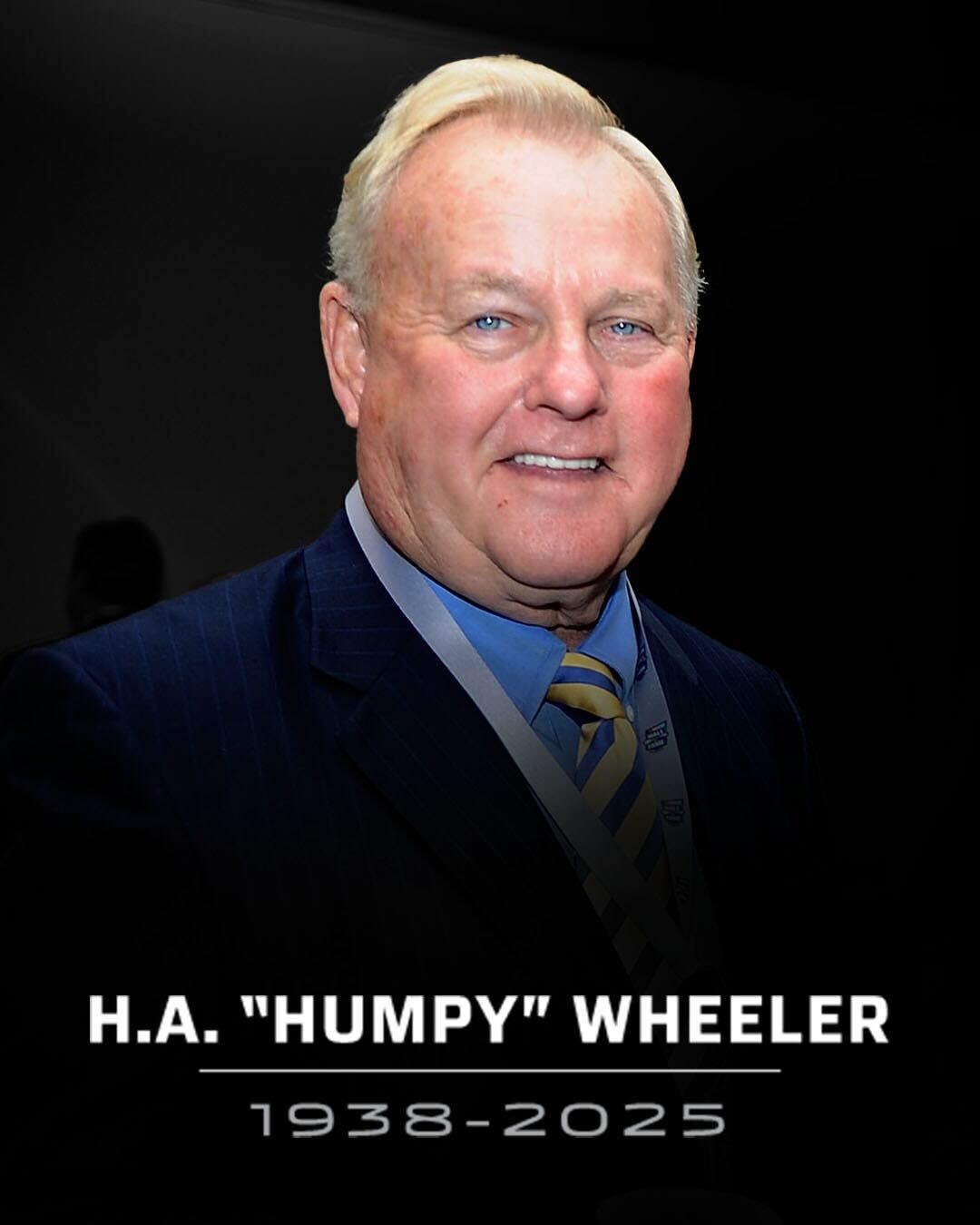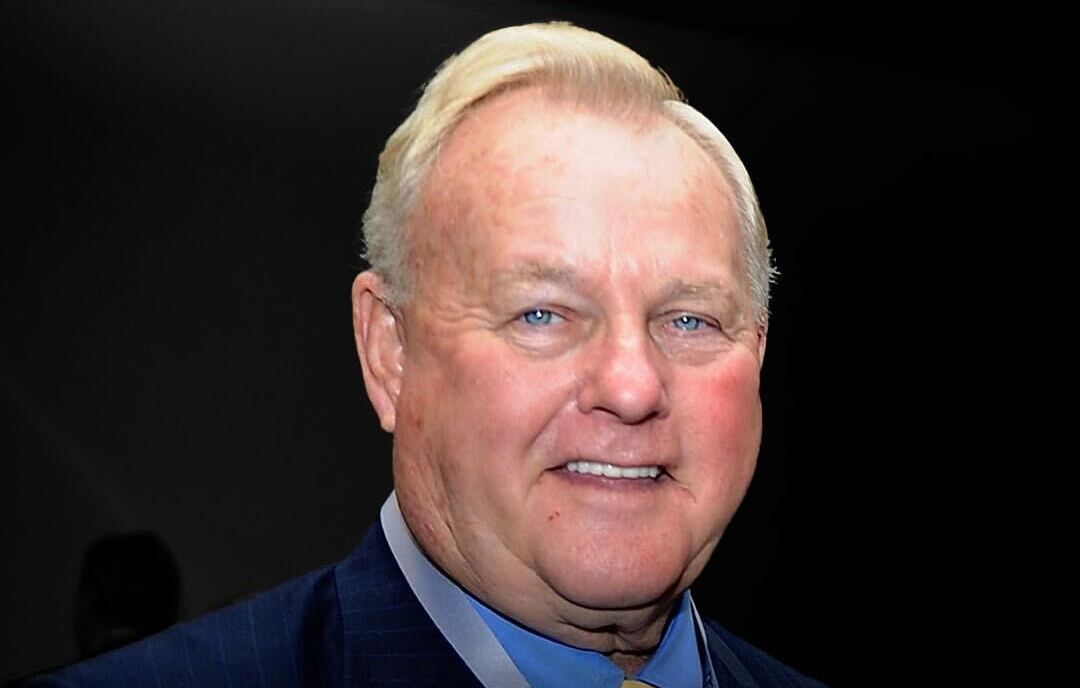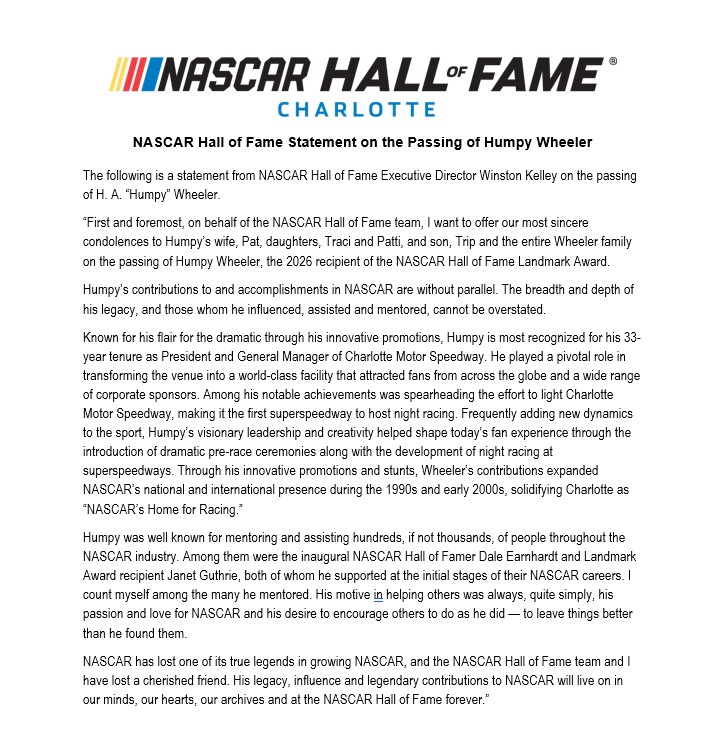Track News: Famed NASCAR Race Promoter Humpy Wheeler dead at 86
Today the NASCAR family mourns the loss of 86-year-old Charlotte Motor Speedway promoter H.A. “Humpy” Wheeler.

H.A. “Humpy” Wheeler, who helped usher NASCAR’s presence onto the national stage in the 1970s with imaginative, often over-the-top pre-race shows and a completely new vision to race-track facilities, has died. He was 86.
Wheeler, a native of Belmont, North Carolina, was named as the recipient of the Landmark Award for Outstanding Contributions to NASCAR for the Hall of Fame Class of 2026.
Wheeler spent 33 years at the helm of Charlotte Motor Speedway, a 1.5-mile facility that under his supervision became one of the sport’s first show places. But it was his pre-race extravaganzas that just as often were the talk of the series. They ran the gamut from school-bus vehicles leaping row upon row of junkyard-bound cars to Robosaurus, a towering, fire-breathing, car-crunching mechanical robot, to recreations of numerous military operations — including the invasion of Grenada.
“Humpy Wheeler was a visionary whose name became synonymous with promotion and innovation in our sport,” said NASCAR Chairman and CEO Jim France in a statement. “During his decades leading Charlotte Motor Speedway, Humpy transformed the fan experience through his creativity, bold ideas and tireless passion. His efforts helped expand NASCAR’s national footprint, cement Charlotte as a must-visit racing and entertainment complex and recently earned him the NASCAR Hall of Fame’s prestigious Landmark Award for Outstanding Contributions to NASCAR. On behalf of NASCAR and the France family, I extend my heartfelt condolences to the Wheeler family and all who were touched by his remarkable life and legacy.”
Pre-race entertainment was just one part of Wheeler’s efforts to build Charlotte Motor Speedway and ownership group Speedway Motorsports Inc. into a successful, thriving entity.
“I thought big events should have a lot of fanfare with them,” Wheeler told the Raleigh (N.C.) News and Observer in a 1997 interview. “I’ve never been to a big event, whether it’s a world heavyweight championship fight or an Indy 500 where there wasn’t a lot of tension before it, even among the competitors.
“You’ve got to have that. And part of this whole thing was to create an atmosphere that would entertain the fans but also get the competitors fired up.”
Charlotte was the first track to build condominiums on site, offer fine dining in a restaurant overlooking the race track and, most telling of all, the first speedway of its size to feature racing under the lights.
Holding NASCAR’s All-Star Race, known at the time as The Winston, under the lights at CMS was Wheeler’s brainchild, an idea that was formed quickly and off the cuff in an effort to entice series sponsor R.J. Reynolds to keep the annual event at his facility.
The first race under the lights in 1992 was an overwhelming success and featured a side-by-side finish between drivers Davey Allison and Kyle Petty — with Allison wrecking after taking the checkered flag and winding up in the hospital for overnight observation.
Soon, other facilities began adding lights — including some of the series’ largest — and night racing quickly became as common as Sunday afternoon starts.
Wheeler’s father, H.A. Wheeler Sr., was athletic director and football coach at Belmont Abbey College and picked up the “Humpy” nickname from football teammates at the University of Illinois after he was caught smoking Camel cigarettes.
The moniker was eventually passed on to the son.
The younger Wheeler witnessed his first auto races at nearby Charlotte Speedway, the old three-quarter mile dirt track located near Charlotte Douglas International Airport and site of NASCAR’s inaugural season-opening race in 1949. Bitten by the racing bug, the 11-year-old began promoting bicycle races in his hometown.
His career move toward promoting local auto races didn’t begin in earnest until after graduation from the University of South Carolina, where he played football with former NASCAR executive Jim Hunter and graduated with a double major in journalism and political science. His football career ended his junior year after Wheeler suffered a broken back during a preseason scrimmage.
Wheeler also strongly considered a career as a professional boxer — he had a 40-2 record and won the Golden Gloves light heavyweight title and dreamed of making the U.S. Olympic boxing team in 1960. A trip to New York City with his father and then-Belmont Abbey basketball coach Al McGuire changed his mind about that particular career path, however.
After visiting Stillman’s Gym, a boxing mecca, in New York City, McGuire drove the Wheelers through the Bowery.
“There were down-and-out (alcoholics) everywhere,” Wheeler recalled in a 1979 interview with the Charlotte Observer. “Al kept pointing people out and calling names. ‘That guy used to be a good middleweight,’ he’d say. Or ‘That big feller there was a heckuva light heavyweight.’
“By the time he was through, I’d decided that I didn’t want to be a fighter anymore.”
Instead, Wheeler turned his focus back to auto racing, and for several years, he promoted races in and around the Carolinas. In the early 1960s, he promoted both Fairgrounds Speedway and Robinwood Speedway in Gastonia, North Carolina.
His flair and early success earned him more work — such was the case in 1962 when he was handed the reins to promote racing activities at Fairgrounds Speedway during the annual Spindle City Fair in September. Wheeler promptly came up with “Speed-O-Rama,” a weeks’ worth of racing activities that included both automobile and motorcycle racing. As part of the program, he brought in Jack Kochman’s world famous International Hell Drivers on bikes.
Years later, memories of such events would bring a smile to Wheeler’s face and a knowing nod from those who knew the savvy promoter.
He gave up the local, weekly track efforts to join Firestone Tire and Rubber Co., becoming that group’s liaison for stock-car racing. It was, he once said, where he got his “real racing education.”
Bruton Smith, another local track promoter, brought Wheeler in to oversee Charlotte Motor Speedway in late 1975. In February of the next year, Wheeler was named vice president and general manager of the facility.
While overseeing CMS, Wheeler also delved into another racing series, coming up with the plan for Legends cars. Those popular, scaled-down speedsters that can be found racing weekly at venues across the country. The company U.S. Legends Cars International, which he helped foster, has put thousands of wanna-be Dale Earnhardts — or Richard Pettys or Jeff Gordons — behind the wheel.

Statement from NASCAR Chairman and CEO Jim France
“Humpy Wheeler was a visionary whose name became synonymous with promotion and innovation in our sport. During his decades leading Charlotte Motor Speedway, Humpy transformed the fan experience through his creativity, bold ideas and tireless passion. His efforts helped expand NASCAR’s national footprint, cement Charlotte as a must-visit racing and entertainment complex and recently earned him the NASCAR Hall of Fame’s prestigious Landmark Award for Outstanding Contributions to NASCAR. On behalf of NASCAR and the France family, I extend my heartfelt condolences to the Wheeler family and all who were touched by his remarkable life and legacy.” – Jim France, NASCAR Chairman and CEO

